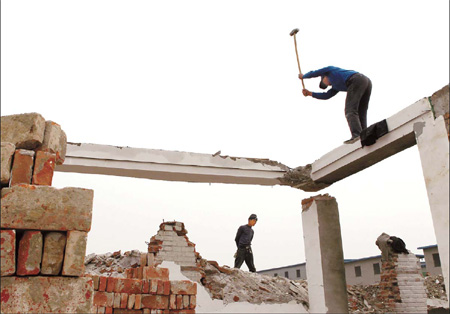Top Stories
Villagers brace for wrecking ball
By Qin Zhongwei (China Daily)
Updated: 2010-04-02 09:33
 |
Large Medium Small |
Householders refuse to make way for planned financial service area
Residents of Changdian village in Chaoyang district are refusing to move out of their homes to make way for a proposed financial services park because the compensation they are being offered is far less than they were expecting.
|
 Scavengers sift through the debris of Changdian village. Wang Jing / China Daily |
Changdian village government is offering households a 160,000-yuan inducement, on top of other compensation already on the table, in a bid to get people to shift.
Most residents, though, are holding out and waiting to the last minute in the hope of getting a better offer. Some are even still hoping their village will be spared from the wrecking ball.
Liu Zaizhong, is among those who does not want to leave. The security guard who lives in a 240-sq-m home with three relatives says the compensation of 6,000 yuan per sq m means the family would get about 1.6 million yuan if it relocates.
"Where can we relocate to with the money they are offering, with house prices everywhere skyrocketing?" he asked.
He said none of his neighbors or friends were prepared to move out of the village for the money on offer.
"We are all waiting," he said.
Chaoyang district launched a land reserve initiative last summer, seeking to free up 26 sq km, or some 40 percent of its rural area. The land will be available in the future for major projects.
Changdian village, which is in the district's Jinzhan township, is one of 43 villages slated for demolition and is among the first to stare down the demolition teams. The 43 villages are home to around 100,400 people and in Changdian alone there are several thousand households.
Under the plan, Jinzhan township will be transformed into a financial services park aimed at companies that provide back-up services for multinational companies and banking corporations.
The local government is encouraging villagers to take the compensation and move out as quickly as possible.
People were supposed to start moving out on March 25 and the exodus was expected to last one month.
Despite the fact that few people have moved out of the village, demolition has already begun.
A short distance from Liu's home, a large area has been cleared that was formerly the site of a factory.
And shops and restaurants near the core of the village have been closing one by one.
In their place, garbage collection stations have been opening all over the village and advertisements offering moving services have been stuck on doors and walls.
A woman living in a two-story building with a big courtyard near Liu's house said she and her family have no idea where they will go.
She said she was still hoping the demolition would not happen.
In addition to complaints about inadequate compensation, many in the village, especially elderly residents who have lived there for many years, do not want to leave their homes and end up in high-rise buildings.
| ||||
"Actually, we don't want to leave here no matter how much money we get in compensation," he said.
He, like other villagers, has been told he can move back into the area in around two years after it has been redeveloped.
"But I am worried our money will not be able to afford the payment," he said.
Meanwhile, the middle-aged man has put up a poster outside his house offering two rooms for rent.
While he's hoping his rooms make him some money, he admits the extra income is not likely to last for long.
"Probably, at the most, there is only one or two-month's business," he said.











